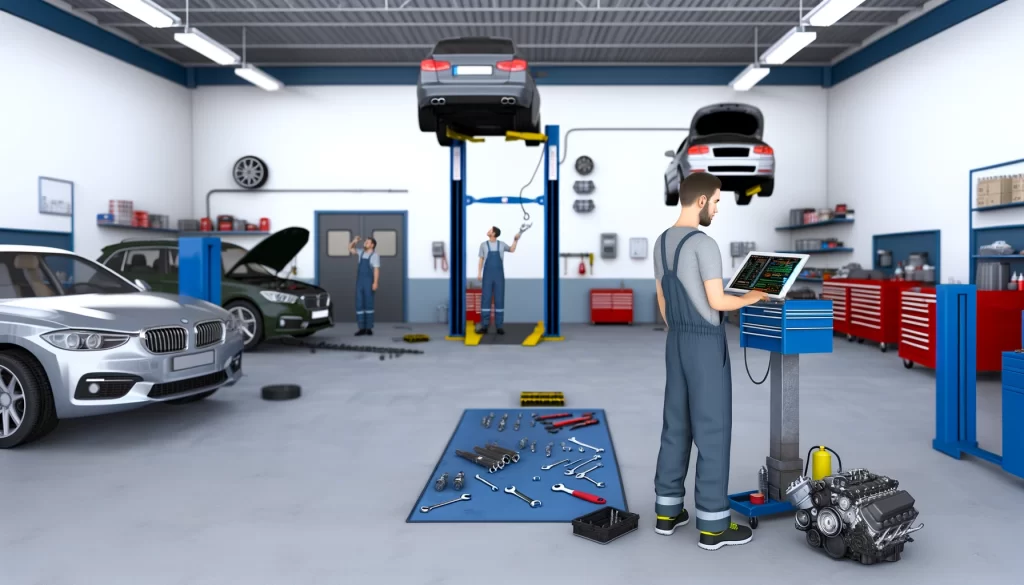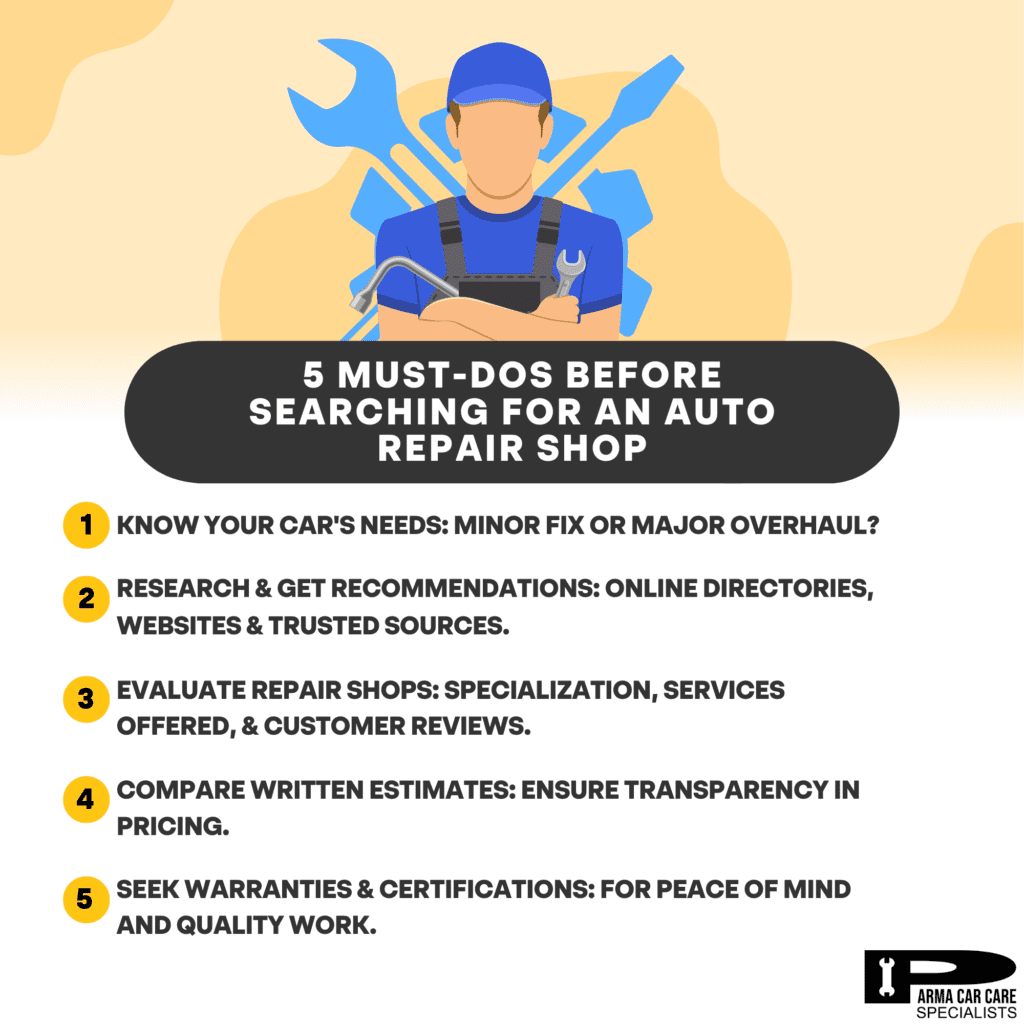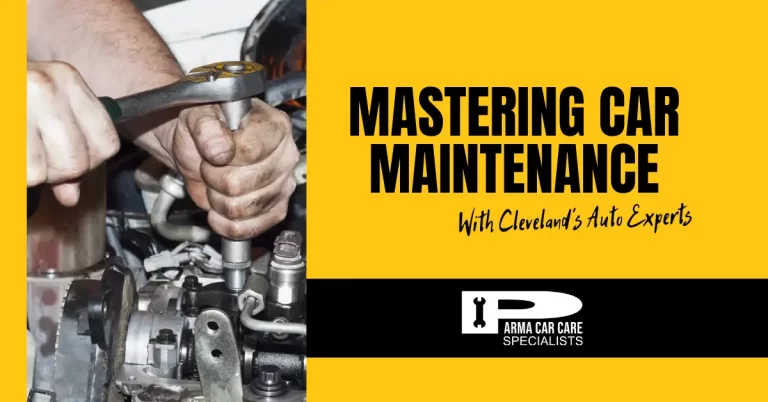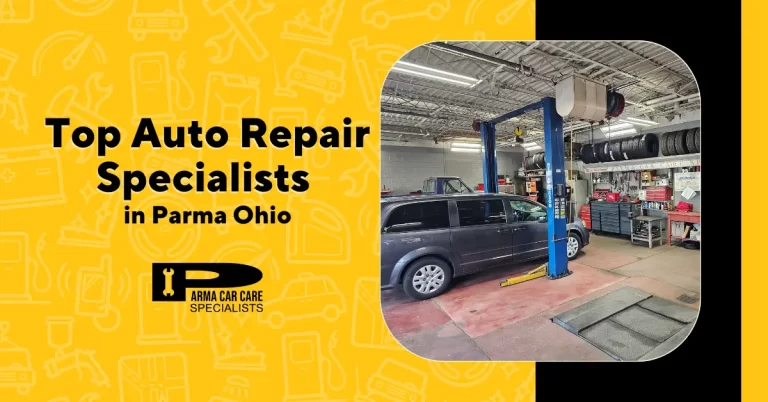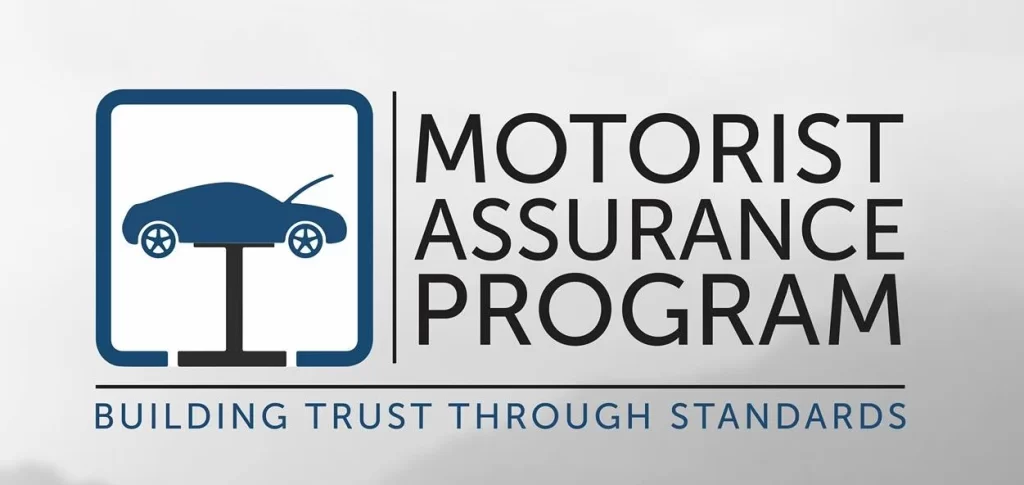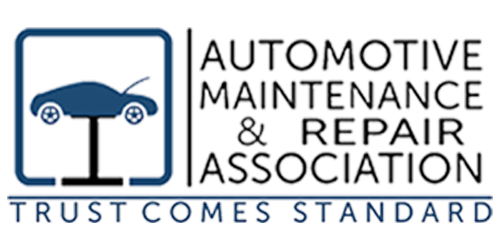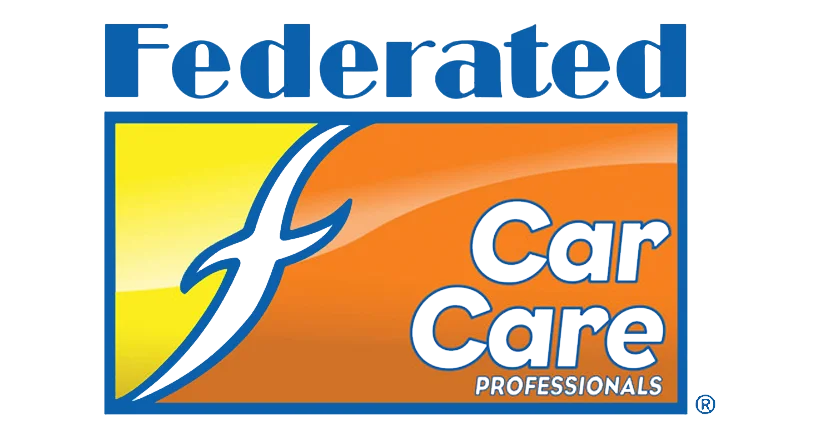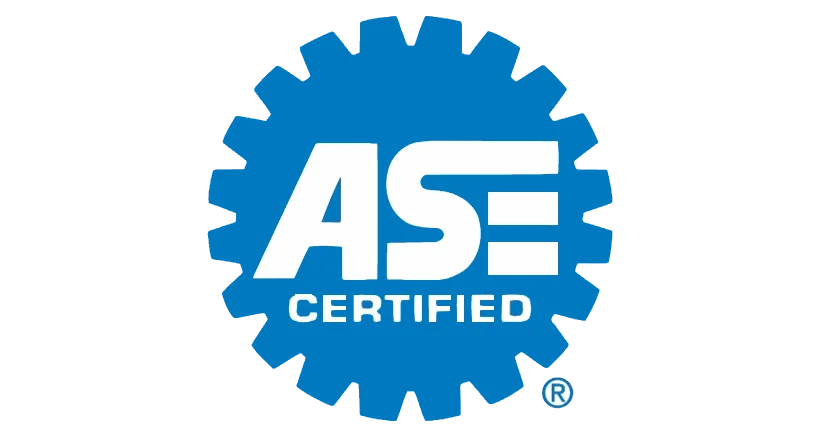The Ultimate Guide to Shopping Around for Car Repairs
Finding a trustworthy car repair shop and reliable repair car garage can feel like searching for a unicorn: mythical and elusive. But fear not, fellow car owners! This guide will help you care for your car with confidence without overspending. The guide includes the necessary knowledge and tools to help you achieve this.
Step 1: Understanding Your Car’s Needs
Before diving headfirst into a mechanic hunt, take a moment to diagnose your car’s woes. Is it a minor issue, like a flickering headlight, or a more significant problem, like strange noises coming from the engine? Here’s a breakdown to help you categorize the situation:
- Routine Maintenance: Oil changes, tire rotations, filter replacements – these are all essential preventative measures that keep your car running smoothly and safely.
- Minor Repairs: Dim lights, faulty wipers, or a slow leak in a tire – these hiccups can usually be addressed quickly and affordably.
- Major Repairs: Engine trouble, transmission issues, or a significant collision – these scenarios require a seasoned mechanic with specialized expertise.
Step 2: Unleashing the Power of Research
The Internet is a vast source of information that is easily accessible at your fingertips. Although it is up to your discernment skills to help you choose a reliable auto repair shop. Here are some resources to leverage in your search:
- Online Directories: Platforms like Yelp, Google Maps, and Angie’s List compile user reviews, ratings, and contact details for repair shops in your area.
- Mechanic Websites: Reputable shops often have websites showcasing their services, certifications, and customer testimonials.
- Industry Associations: Directories of certified mechanics are maintained by organizations like the Automotive Service Excellence (ASE) and the Automotive Service Association (ASA).
Step 3: Don’t Discount the Power of Word-of-Mouth
While online reviews hold value, sometimes, the best recommendations come from trusted sources. Here’s how to tap into your network:
- Chat with car-savvy friends and family: Ask about their recent repair experiences. Positive recommendations are gold!
- Seek advice from colleagues: Chances are, someone in your office has a reliable mechanic they swear by.
- Engage with online car communities: Facebook groups or forums dedicated to your car model can be a treasure trove of local repair shop insights.
Step 4: Evaluating the Repair Shop Offerings
Not all car repair shops are created equal. Here’s what to consider when assessing potential candidates:
- Specialization: Does the shop have experience working on your specific car make and model? Specialization translates to better service and faster repairs.
- Service Range: Does the shop offer the services you require? Look for a comprehensive range, including routine maintenance, major repairs, diagnostics, and warranty work.
- Loaner Programs: Does the shop offer loaner cars while your vehicle is being serviced? This can be a lifesaver if you rely on your car for daily commutes.
- Customer Amenities: Consider waiting room amenities like Wi-Fi, comfortable seating, or complimentary beverages. A comfortable wait can make a stressful situation more manageable.
Step 5: Reputation is Key: Reviews and Ratings
In today’s digital age, online reviews hold immense power. Here’s what to pay attention to when sifting through reviews:
- Overall Rating: A high average rating is a good sign, but delve deeper.
- Review Content: Read through individual reviews to get a sense of customer experiences. Positive reviews highlight quality service, fair pricing, and clear communication.
- Negative Reviews: Don’t dismiss negative reviews entirely. See how the shop addressed customer concerns. A prompt and professional resolution is a positive sign.
Step 6: Price Transparency Matters
Cost is an important factor to consider, but it’s important to keep in mind that the cheapest option may not always be the best one. Here’s how to approach pricing:
- Request Written Estimates: Always ask for a written estimate outlining the repairs needed, parts required, and labor costs. This ensures transparency and avoids unexpected charges.
- Compare Estimates: Get estimates from several shops for the same work. This allows you to compare pricing and identify potential outliers.
- Beware of Hidden Fees: Ensure the written estimate from car repair places you are planning to engage includes all costs, including parts, labor, taxes, and any shop fees.
Step 7: Seeking Assurance: Warranties and Certifications
Peace of mind is priceless when it comes to car repairs. Here’s what to look for:
- Warranty on Repairs: A reliable shop will stand behind its work with a clear warranty policy.
- Mechanic Certifications: Look for shops with mechanics certified by organizations like ASE. Certification indicates that mechanics have met industry standards for knowledge and skills.
Bonus Tip: Building a Long-Term Relationship with Your Mechanic
Finding a trustworthy mechanic is like discovering a hidden gem. Once you’ve identified a reliable repair shop, cultivate a long-term relationship for several benefits:
- Service History: The shop can build a record of your car’s maintenance and repairs, allowing them to catch potential issues early on and suggest preventative measures.
- Familiarity Breeds Efficiency: A familiar mechanic already understands your car’s quirks and can diagnose problems faster, saving you time and money.
- Trust and Transparency: A long-term relationship fosters trust and open communication. You’ll feel more comfortable discussing car concerns and confident that the mechanic has your best interests at heart.
Maintaining Your Car Between Repairs
Taking care of your car between repairs goes a long way in preventing problems and extending its lifespan. Here are some simple tips:
- Regular Maintenance: It is important to follow the manufacturer’s recommended maintenance schedule, including oil changes, filter replacements, and routine checks.
- Warning Signs: Don’t ignore warning lights or unusual noises. Early detection of problems prevents them from snowballing into expensive repairs.
- DIY Maintenance: For the mechanically inclined, there are basic maintenance tasks you can tackle at home, like topping up fluids or checking tire pressure.
Empowered Car Ownership: Beyond Repairs
This guide has equipped you to navigate the world of car repairs with confidence. But empowered car ownership extends beyond just fixing problems. Here are some additional tips to become a more knowledgeable and proactive car owner:
- Understanding Your Owner’s Manual: This might sound dull, but the owner’s manual is a treasure trove of information specific to your car. Familiarize yourself with routine maintenance schedules, fluid capacities, and recommended service intervals.
- Learning Basic Car Care: Equipping yourself with some basic car knowledge can be empowering. You can learn how to check tire pressure, top up fluids, and change wiper blades – all tasks that can save you time and money in the long run. There are multiple video tutorials and online resources available to guide you.
- Investing in Quality Parts: When repairs are necessary, don’t be afraid to ask about the quality of the parts being used. While aftermarket parts can be cheaper, opting for genuine manufacturer parts or high-quality alternatives can ensure better performance and longevity for your car.
- Understanding Warning Lights: Your car’s dashboard is filled with a complex network of warning lights. Familiarize yourself with the common ones – like the check engine light, low oil pressure light, or brake system warning – so you can take prompt action when they illuminate.
- Staying Informed: The automotive world is constantly evolving. Subscribe to reputable online car care publications or YouTube channels to stay updated on industry trends, common car problems, and potential recalls for your specific vehicle.
The Takeaway: Knowledge is Power
By taking the initiative to learn about your car and its needs, you become a more informed and empowered owner. This knowledge translates to:
- Reduced Repair Costs: It is crucial to catch minor issues at an early stage to prevent them from developing into more significant problems that could result in expensive repairs.
- Improved Safety: Regular maintenance and timely repairs ensure your car operates safely and reliably.
- Peace of Mind: Knowing your car is well-maintained reduces anxiety and allows you to enjoy the freedom and convenience your vehicle provides.
Remember, car ownership doesn’t have to be a daunting experience and if you find a trustworthy vehicle repair shop, you’re all set. With a bit of knowledge, proactive maintenance, and a reliable mechanic in your corner, you can navigate the road with confidence!
Happy and Healthy Car Ownership
By taking these steps and being proactive, you can turn car repairs into a confident and informed process instead of a dreaded experience. Keeping your vehicle in good condition is important for its safety and reliability. Regular car maintenance, with the help of a reliable mechanic, can help ensure smooth and safe driving for many miles.
If you’re looking for auto repair in Cleveland, Ohio, consider Parma Car Care Specialists. With our team of certified mechanics and commitment to customer satisfaction, we strive to be your go-to car mechanic shop for all your auto repair needs.


